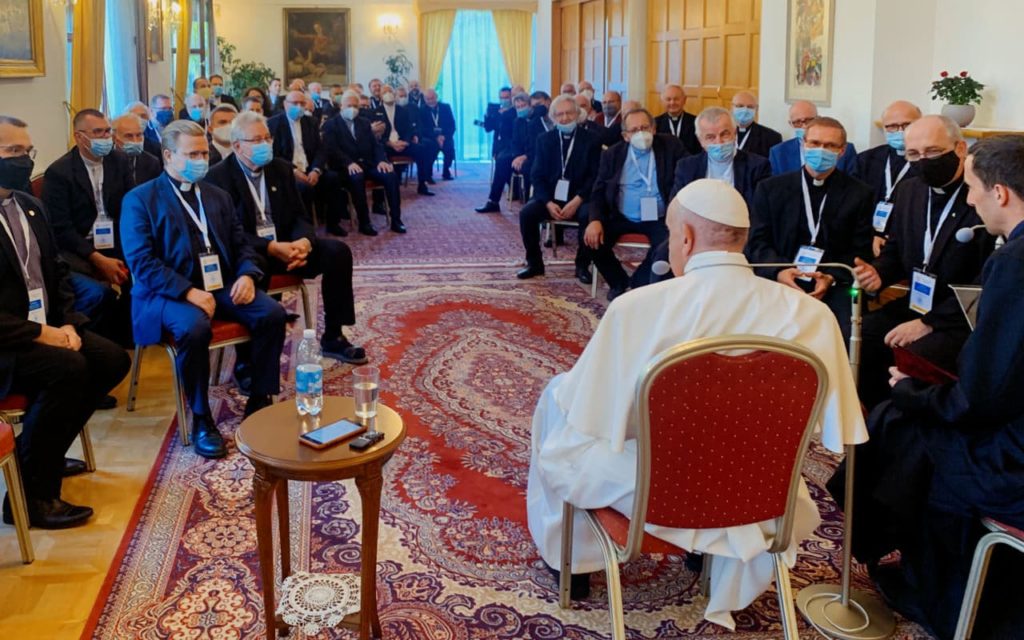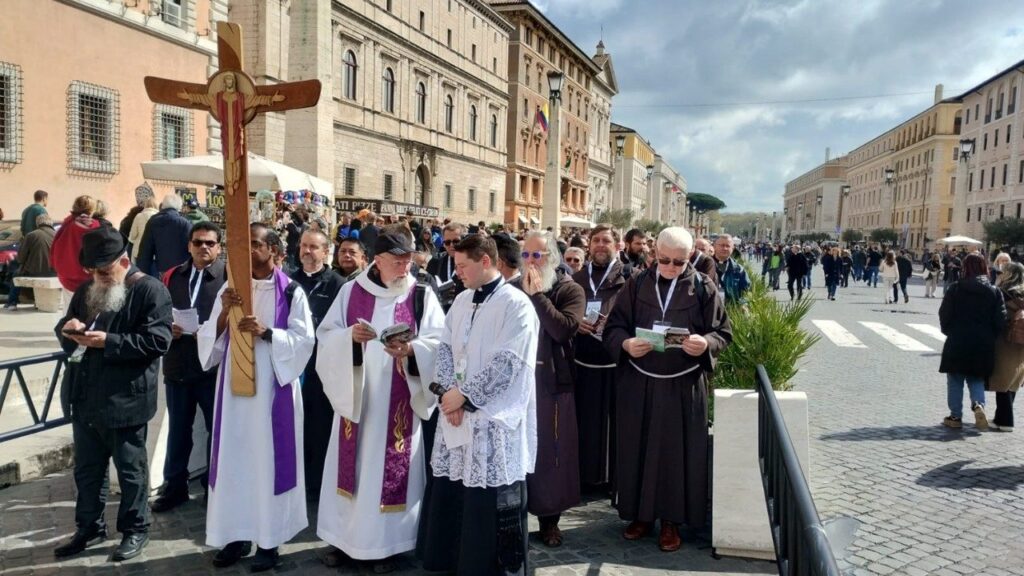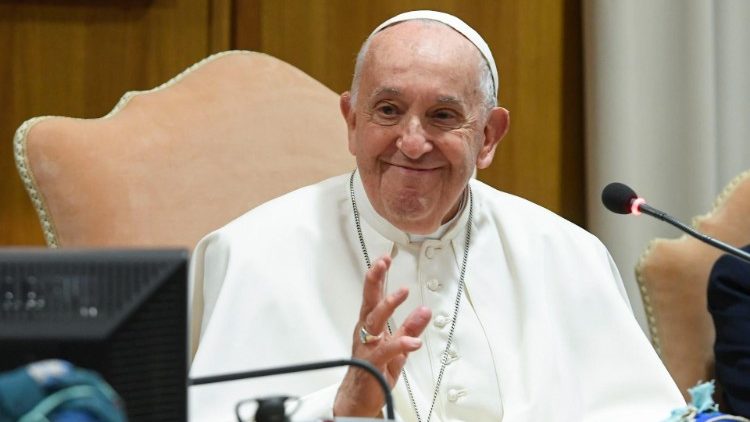Pope to Slovak Jesuits: ‘It Scares Us to Be Free’
Meeting During His 34th International Apostolic Journey

On Sunday, September 12, 2021, at the height of his 34th International Apostolic Journey, and just after meeting with the Ecumenical Council of Churches in Bratislava’s Apostolic Nunciature, Pope Francis received 53 Slovak Jesuits, with whom he conversed for a long time, pointing out to them that in “a world so conditioned by addictions and virtuality, it scares us to be free.”
In the meeting, shared today, Tuesday, September 21 by La Civiltà Cattolica review, the Pontiff talked about “a very important word that describes the Church’s suffering at this time: the temptation to go back. We are suffering this in the Church today: the ideology to go back. It’s an ideology that colonizes minds. It’s a form of ideological colonization. In reality, it isn’t a universal problem, but, rather, is specific of the Churches of some countries (. . . ).”
Life scares us; it scares us to celebrate in front of the People of God who look at us in the face and tell us the truth. It scares us to go forward with pastoral experiences (. . . ) We are scared to accompany people with sexual diversity. We are afraid of the crossroads that Paul VI spoke about to us. This is the evil of the time. To seek the way in rigidity and clericalism, which are two perversions.”
I believe that today the Lord is asking the Society to be free, with prayer and discernment. It’s a fascinating time, a beautiful fascination, even if it’s the fascination of the cross: beautiful to carry forward the freedom of the Gospel. Freedom! You can live this going back in your community, in your Province, in the Society <if you so wish. <But> it’s necessary to be alert and to watch. It’s not a praise of imprudence, but I want to point out to you that to go back isn’t the correct way. The way is to go forward with discernment and obedience,” he added.
Pastoral Work and Fervour
Addressing what the Jesuits must include for their pastoral work in Slovakia, the Pontiff referred to “closeness.” First with God: True prayer, from the heart, not formal prayer, which doesn’t touch the heart. Prayer that struggles with God, and knows that desert where nothing is felt. Closeness with God: He always waits for us.” Second, among them is: “Love between brothers, the austere love of the Jesuits is very fine, charitable, but also austere: love of men.
Third, is closeness with the Bishop. ”It’s true that there are Bishops who don’t like us; yes, it’s a reality. However, let not Jesuits be found that speak badly of the Bishop!” and, fourth, is <closeness> with the People of God. “It’s true that if we are really men who go to the crossroads and to the limits, we will create problems. However, what will save us from falling into stupid ideologies is closeness to the People of God. And so we will be able to go forward with an open heart.”
Responding to a question on the present situation of the Society of Jesus, and the “lack of fervor,” the Bishop of Rome said: “No, it’s certainly not easy. However, when you feel that fervor is lacking, you must engage in discernment to understand why. You must speak with your brothers. Prayer helps to understand if fervor is lacking and how much fervor is lacking. It’s necessary to talk with brothers, with Superiors, and then to engage in discernment to know if it’s personal desolation or, rather, communal desolation.
Danger of the Gender Ideology
Addressing the current topic of gender ideology, the Holy Father said that “ideology always has a diabolic enchantment.” At this time, we are living in a civilization of ideologies, that’s certain. We must unmask them by the root.” The “gender” ideology is “dangerous because it is abstract in regard to a person’s concrete life as if people could decide abstractly if and when they want to be a man or a woman.” Abstraction is always a problem for me. However, this has nothing to do with the homosexual question. If there is a homosexual couple, we can engage in pastoral care with them, go to the encounter with Christ. When I speak of ideology, I’m speaking of the idea, of the abstraction that enables everything to be possible, not of people’s concrete life or their real situation,” he clarified.
Communication with the Exterior
The Holy Father says that the Judeo-Christian dialogue is making headway. “It’s absolutely necessary to avoid interruptions, to have the dialogue break, that it is interrupted due to misunderstandings, as sometimes happens.” About going beyond people that regard it with suspicion, he said that, for example, “there is a great chain of Catholic television that speaks constantly badly about the Pope with no problem. It might be that I personally deserve these attacks and insults because I am a sinner, but the Church doesn’t deserve this: it’s the work of the devil, I even said it to some of them.”
“There are also clerics that make disagreeable comments about me. Sometimes I lose patience, especially when they make judgments without entering into a true dialogue. I can’t do anything there. For my part, I continue to go forward without entering their world of ideas and fantasies. I don’t want to enter it so I prefer to preach, to preach . . . Some accused me of not speaking about holiness. They say that I always speak about the social question and that I’m a Communist. And, yet, I wrote a complete Apostolic Exhortation on holiness, Gaudete et Exsultate,” he reminded.
He also expressed the hope that in the “decision to put an end to automatism of the old Rite we can return to the true intentions of Benedict XVI and John Paul II. My decision is the fruit of a consultation with all the Bishops worldwide, held last year. Henceforth, whoever wants to celebrate with the vetus ordo must ask Rome for permission, as happens with spiritualism. However, there are young men that after a month of their Ordination go to the Bishop to request it. This is a phenomenon that shows we are going back.”
Migration and Refugees
In regard to the migratory question, the Successor of Peter stressed the necessity to “receive the immigrants, but not only that: it’s necessary to welcome, to protect, to promote and to integrate them. True reception requires compliance with each of these stages. Each country must know to what point it can do so. To leave immigrants without integration is like leaving them in misery, it’s equivalent to not receiving them.”
“However, it’s necessary to study this phenomenon well and to understand the causes, especially the geopolitical ones. It’s necessary to understand what is happening in the Mediterranean and the tactics of the powers that look out on that sea, to control and dominate it, and to understand the reasons why and the consequences,” he concluded.
Translation by Virginia M. Forrester
Related

Technology with a Human Face: Pope Francis’ Call for Ethical and Caring Use
Exaudi Staff
01 April, 2025
1 min

Pope Francis Continues Optimistic Recovery and Maintains Work Pace
Exaudi Staff
01 April, 2025
2 min

The Pope to the Missionaries of Mercy: God became man to reveal to the world that he never abandons us!
Exaudi Staff
30 March, 2025
2 min

God’s Mercy and the Call to Peace in Pope Francis’ Angelus
Exaudi Staff
30 March, 2025
3 min
 (EN)
(EN)
 (ES)
(ES)
 (IT)
(IT)

